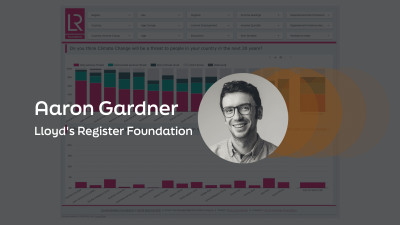
Improving access to redress for workers vulnerable to violence and harassment in South Asia
Experts discuss the factors that make some workers more vulnerable than others to violence and harassment.
This page is approximately a 4 minute read
This page was published on
This page was written by Dr Aaron Ions Gardner

At Lloyd’s Register Foundation, we are committed to the principles of open and accessible data, as it gives the research we fund the best possible chance to have a positive impact on safety. As such, we are excited to have gone live with our new World Risk Poll Data Explorer, an easy and intuitive tool for navigating the source data on people’s experiences and perceptions of risk featured in our four major 2021 Poll reports: ‘A Changed World?’, ‘A Resilient World?’, ‘A Digital World’ and ‘Safe at Work?’.
Here at the Foundation our mission is to engineer a safer world. To support this mission, the World Risk Poll bridges crucial knowledge gaps by investigating people's perceptions and experiences of risk, including among people, countries and regions that are underrepresented in other surveys and official data sources.
Making these huge datasets – covering over 125,000 people in 121 countries in 2021 alone – freely available is a crucial step in improving transparency and understanding, and both the 2019 and 2021 World Risk Poll datasets are freely available and free to use (with attribution). Similarly, the upcoming World Risk Poll 2023 dataset will be made available once collection and analysis is completed next year.
Embracing the practice of making datasets open is crucial in fostering innovation, driving scientific progress, and empowering society. By making datasets openly accessible, we unlock a treasure trove of knowledge, enabling researchers, developers, and innovators to leverage this wealth of information for the greater good.
Moreover, open datasets foster collaboration and collective problem-solving. When researchers from different domains can access and analyse shared datasets, they can pool their expertise, combining insights and perspectives to address intricate challenges. This collaborative approach not only enhances the quality of research but also promotes interdisciplinary collaboration, as experts from diverse fields can explore connections and synergies that may have been overlooked otherwise.
Finally, making datasets like the World Risk Poll open is crucial for building trust in various domains. Open datasets allow researchers, policymakers, and the public to validate findings, replicate studies, and uncover potential biases or errors. By enabling independent verification, open datasets enhance the credibility and reliability of research, improve future research, and increase the credibility of associated messaging.
However, too often the barrier to entry for those interested in asking questions of the data and deriving insight is too high. Whilst making datasets open is a vital step, ensuring their accessibility goes even further in breaking down barriers to entry and promoting inclusivity. Openness alone does not guarantee that everyone can effectively access and utilize the data. By prioritizing accessibility, we enable individuals from diverse backgrounds, with varying levels of technical expertise, and with different access to resources to engage with the data effectively. This includes providing clear documentation, user-friendly interfaces, and promoting interoperability to ensure that data can be easily understood, manipulated, and analysed by a wider audience.
With over 15 million datapoints, the 2021 World Risk Poll can be a challenging dataset to work with. However, with the World Risk Poll Data Explorer it is possible to easily identify global or regional trends from all 125,911 respondents across the 121 countries polled in 2021, or drill down and perform highly focused comparisons at country or demographic levels.
As the Foundation invests in both open and accessible data practices, we can bridge the digital divide, empower marginalized communities, and create a more equitable landscape where individuals and organizations, regardless of their backgrounds or capabilities, can leverage data to drive innovation, make informed decisions, and help engineer the safer world we are working towards.
Aaron is a research scientist with over 15 years of experience working with big data to derive insight and deliver impact across various sectors. Since joining Lloyd’s Register Foundation in 2021 Aaron has led the analysis of the World Risk Poll, a unique global survey on public perceptions and experience of risk and safety.
Find out more about Aaron